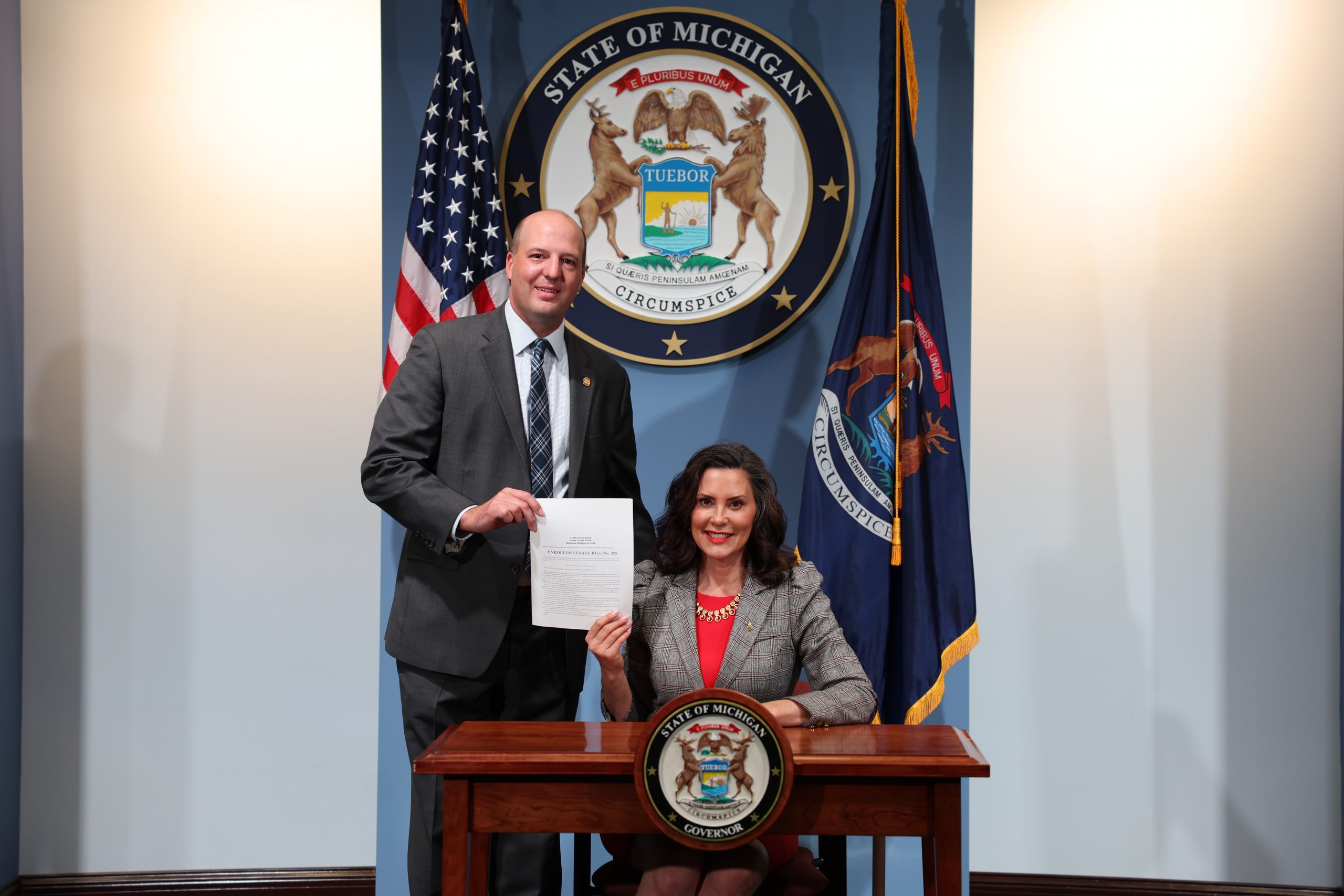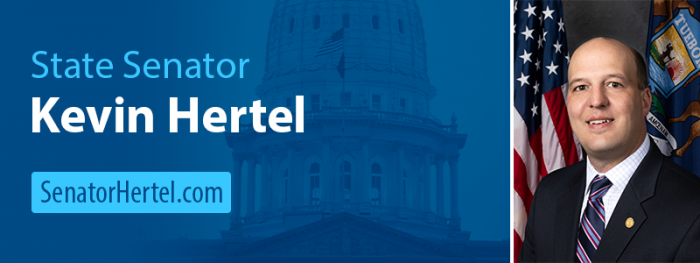Dear Neighbor,
With the cool autumn air officially here, my colleagues and I have returned to Lansing after a summer full of community connections, events, and celebrations. Back at the Capitol, we’ve hit the ground running to advance legislation to increase support for first responders, unlock historic funding for our classrooms, and so much more. In this newsletter, I want to take a moment to provide an update on what our team has been working on to deliver results for residents across our lakeshore community.
Also, as September is Suicide Prevention Awareness Month, please know that if you or a loved one is struggling, you are not alone — help is available by calling or texting 988, the 24/7 suicide and crisis lifeline. You can find additional resources and learn more about our work to expand access to behavioral health treatment later in this newsletter.
As always, I’d love to hear from you about the topics you’re interested in. Please feel free to reach out to my office to share your perspective or seek assistance with any challenges you may be facing with state departments — we are here to serve you. You can reach my office by calling (517) 373-7315 or emailing SenKHertel@senate.michigan.gov. I hope to hear from you soon!
Sincerely,

Kevin Hertel
State Senator
District 12
Included in This Newsletter
- Legislative Update
- Taking Action to Expand Access to Mental Health Care
- Upcoming Events
- Contact Us
Legislative Update
Expanding Survivor Benefits for Public Safety Officers

While many professions are safe, steady, and predictable, the work of our public safety officers is anything but. Their work is defined by uncertainty, yet they choose to sacrifice their own comfort and safety for the security of their community. And while they may not have a uniform to put on, their families are right alongside them, providing comfort and support, spending days and nights worrying about the wellbeing of their loved one and whether or not they’ll make it back home.
Currently under the Public Safety Officers Benefit Act, if a public safety officer dies or is permanently disabled in the line of duty, the officer’s surviving spouse and dependents are eligible for a one-time payment of $25,000. This amount has not been updated in two decades, failing to keep up with the increased cost of healthcare and funeral arrangements. To rectify this issue, I introduced Senate Bill 834 which would double the benefit amount to $50,000 to ensure adequate support for the families of those who have made the ultimate sacrifice.
While no amount of money can ever fully repay the debt we owe to these brave safety officers or to the families they leave behind, we can — and must — do better by them. This week, the Senate unanimously passed this legislation, and it now heads to the House for their consideration.
Read more here or listen to my floor speech on the legislation here.
Making Transformational Changes to Uplift Students and Teachers

Building up the future of our state begins with investing in the future of our students and the educators who teach them. For too long however, Michigan teachers have been underpaid and undervalued, and too many students have not had access to the materials they need to learn. Because of years of disinvestments made under previous leadership, we have seen educational outcomes drop and fewer folks choose to become teachers.
To fix this problem, Sen. Darrin Camilleri and I worked to bring forth structural, transformational change that will unlock over $600 million for school districts across Michigan. As a result of my bill, Senate Bill 911, local school districts will have greater flexibility and resources to put additional dollars behind school safety, mental health, teacher salaries, and more.
Additionally, this legislation provides important cost savings for our teachers too. Currently, some teachers pay a 3% tax on their income that goes into a health care fund for retirement, also known as OPEB, which is 140% funded with an excess of $670 million. Senate Bill 911 eliminates this required contribution, allowing our educators to keep more of their hard-earned money.
This action represents the largest transformational change in education we’ve seen in a decade, delivering a sizable funding boost to uplift all those in the classroom. I recently joined Kevin Dietz on WJR Radio to discuss this legislation and the impact it will have on all those in the classroom. Listen here.
Protecting Homeowners from Predatory Practices
Selling a home is never an easy thing to do, and when realtors engage in predatory practices, it becomes even more difficult. Believing Michigan property owners deserve the ability to make informed decisions about a monumental life event without fear of coercion or deception, I introduced Senate Bill 602.
This legislation specifies conditions under which a right-to-list home sale agreement between a residential property owner and a real estate broker would be void and unenforceable. This summer, this legislation was signed into law, helping us curb exploitative right-to-list home sale agreements and put the best interests of homeowners at the forefront of our laws.
Read more about this legislation here.
Updating Michigan’s Standards for Fire Alarms

As someone who lost much of his childhood home in a fire, I know firsthand how important it is for families to be immediately alerted if the unthinkable happens. That’s why I introduced Senate Bill 328. This legislation updates standards for smoke alarms to help provide Michigan families with the safety and peace of mind they deserve, while also helping them save money in the long run. While fire alarms are not at the top of our mind every day, these regulations serve an important function to each and every Michigander as they clearly define the specific standards needed for fire protection, allowing for the risks to diminish and ensure safety within our communities.
After receiving bipartisan support in both the Senate and House, Gov. Gretchen Whitmer recently signed this bill into law.
Read more here.
Establishing the Michigan Voting Rights Act
On National Voter Registration Day, my colleagues and I passed legislation to establish the Michigan Voting Rights Act (MVRA). Building on the progress of the federal Voting Rights Act of 1965, the MVRA would set additional protections at the state level, shielding voters from attacks on exercising their right to vote that have been witnessed in this state and across the country. Outlined in the legislation are protections for Michiganders across race and place, including those with limited-English proficiency and voters with disabilities, to ensure all our voters can confidently and safely exercise their rights at the ballot box.
This legislation now heads to the House of Representatives for further action.
Read more about this legislation here.
Ensuring Michiganders Have the Freedom to Plan Their Futures
While other states work to restrict individuals’ reproductive rights, Michigan is leading the fight to protect freedom of choice for all. This past summer, my colleagues introduced the Freedom to Plan Act which seeks to break down financial barriers to over-the-counter oral hormonal contraceptives and emergency contraceptives — providing Michigan residents with the autonomy, power, and freedom to make their own medical decisions.
For over six decades, contraception has been an integral component of women’s health care. Named as one of the 10 greatest public health achievements of the 20th century by the Centers for Disease Control and Prevention, contraception gives women the power to plan their own course in life. These newly introduced bills build on a series of actions taken by the Michigan Legislature to ensure Michiganders — not politicians — possess the power to determine if and when they would like to begin a family.
Read more here.
Taking Action to Expand Access to Mental Health Care

As Chair of the Senate Health Policy Committee, expanding access to quality, affordable behavioral health care is a top priority of mine. In communities across Michigan, too many folks have too little access to mental health support — a crisis particularly affecting young Michiganders and our veterans. That’s why the Legislature took action and made critical investments in the 2025 State Budget to address this gap in coverage and ensure all residents who need assistance can access it. A few highlights of the budget’s investments in mental health care include:
- $30 million in new funding to increase access to critical 24-hour crisis services, outpatient behavioral health care, primary care, and psychiatric rehabilitation through an expansion of Certified Community Behavioral Health Centers.
- $9.4 million to provide statewide coverage for 988, the suicide and mental health crisis line.
- $48.2 million from the Opioid Healing and Recovery Fund to support substance use disorder treatment and prevention efforts.
- $1.2 million to support suicide prevention programs that help veterans and their families address the trauma related to military service.
Additionally, last year, our team secured $40 million in the state budget for the Macomb County Intake Facility to construct a new central intake and mental health unit, among other upgrades, allowing the county jail to provide better mental and physical health outcomes for those who come in contact with the criminal justice system. Once complete, the new jail is set to become a national model on how to keep our communities safe, while ensuring the needs of our most vulnerable and underserved are met.
These investments build on a number of policies we’ve advanced through the Senate Health Policy Committee and sent to the Governor’s desk, including Senate Bill 27. This legislation requires insurers to cover treatments for mental health and substance use disorders at the same level as physical health services. This means, for example, insurers must provide the same deductibles, copays, and out-of-pocket maximums for behavioral healthcare as they do for other physical care, helping ensure that Michiganders can access the type of healthcare they need, when they need it.
Read more about the policies and investments we’ve made to expand access to mental health supports here.
Helpful Resources
Mental Health Support
September is Suicide Prevention Month, a time when we take a moment to raise awareness and destigmatize the topic. With one in five Americans and nearly 1.5 million Michiganders experiencing mental health issues each year, it’s important to remind ourselves to care for our mental and emotional health.
Please know that help is available for those who are struggling:
- 988 Suicide and Crisis Lifeline: 988 is a 24/7 toll-free nationwide hotline that provides confidential and compassionate care for anyone struggling with behavioral health issues, emotional distress or substance use crisis. If you or someone you know is struggling or in crisis, help is available. Call or text 988 or visit their Lifeline Chat to connect with a trained crisis counselor.
- Veterans Crisis Line: The Veterans Crisis line provides veterans and their family members with 24/7, confidential support. To connect, call 1-800-273-8255 and press 1 or text 838-255. You do not have to be enrolled in VA benefits or health care to call.
- Trevor Lifeline: The Trevor Project has trained counselors who understand the challenges young people in the LGBTQ community face and are available for support 24/7. Call 1-866-488-7386, text 678-678, or click here to speak with a crisis counselor.
Additionally, Michigan Community Mental Health Services Programs (CMHSPs) are available to provide a comprehensive range of services and supports to children, adolescents and adults with mental illnesses, developmental disabilities and substance use disorders in all 83 Michigan counties. Find your local program here.
Apply for the Home Heating Tax Credit by September 30
The Home Heating Tax Credit is a way the state of Michigan helps low-income families pay some of their heating expenses. This year, the average qualifying household received $108 in assistance, which is most often applied directly to residents’ utility bills. With these savings, more Michiganders can have additional money in their pockets to put food on the table, afford medication, pay bills, and more.
Residents can apply for the Home Heating Tax Credit until the September 30 deadline. To qualify, residents must be a renter with a contracted lease or a homeowner and meet income requirements. You can apply for the Home Heating Tax Credit here.
Upcoming Events
It is one of my top goals as your State Senator to have myself and my office be as accessible to you as possible. To share your thoughts on legislation or seek assistance with an issue, please join me at one of our upcoming district events:
Coffee and Conversation

WHEN: Friday, September 20 from 11:00 a.m. – 12:00 p.m.
WHERE: District Office, 28800 Harper, Saint Clair Shores, MI 48081
WHEN: Friday, October 18 from 11:00 a.m. – 12:00 p.m.
WHERE: District Office, 28800 Harper, Saint Clair Shores, MI 48081
District Office Hours with Staff
WHEN: Every Thursday from 9:00 a.m. – 5:00 p.m. and by appointment.
WHERE: District Office, 28800 Harper, Saint Clair Shores, MI 48081
Contact Us
If You Need Help: If you have a problem dealing with any department of state government, such as accessing unemployment benefits, my office is available to help resolve it. While we usually cannot assist with local or federal issues, we will always do our best to help direct you to the appropriate person or organization for help.
You may always feel free to call my office at (517) 373-7315 or email me at SenKHertel@senate.michigan.gov.
Keep Up to Date: Our bi-weekly newsletters are full of updates on what Team Hertel has been working on both in Lansing and District 12 to deliver results for Michiganders. To keep up to date with what we’ve been up to — sign up here to receive my bi-weekly newsletter, or access previous editions online here.
For more frequent updates, I also encourage you to follow our team on Facebook, Twitter and Instagram.

